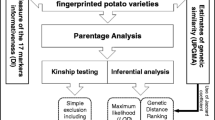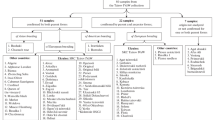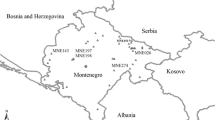Abstract
Knowledge of the parental origin of crop species is a prerequisite for formulating effective strategies for genetic conservation, management, and utilisation of genotypes in breeding programmes and genetic studies. In the case of the potato, although pedigree information is well documented, the possible lack of accurate pedigree data for certain cultivars constitutes a loss of opportunity to exploit the selection gain, the precise targeting of a market niche, or other breeding objectives. In this study, the genetic profiles of 1249 varieties were examined using a set of 35 polymorphic simple sequence repeats (SSR) markers with the available pedigree information to achieve pedigree validation. The maximum likelihood (LOD) was used to validate pedigree information of potato accessions for which the genetic data of at least one parent was available in the dataset. Our results showed that among the accessions for which both parents were genotyped, 81.7% presented a validated pedigree, while 18.3% presented a pedigree conflict (for at least one parent). Among the accessions for which only one parent was available in the dataset, 91.3% presented a validated pedigree, while 8.7% presented a pedigree conflict. Then, pedigree reconstruction was investigated to determine the most likely parent candidates for varieties whose pedigree is either questionable or lacking information.



Similar content being viewed by others
References
Baldwin SJ, Dodds KG, Auvray B, Genet RA, Macknight RC, Jacobs JME (2011) Association mapping of cold-induced sweetening in potato using historical phenotypic data. Ann Appl Biol 158:248–256. https://doi.org/10.1111/j.1744-7348.2011.00459.x
Demeke T, Lynch DR, Kawchuk LM, Kozub GC, Armstrong JD (1996) Genetic diversity of potato determined by random amplified polymorphic DNA analysis. Plant Cell Rep 15:662–667. https://doi.org/10.1007/BF00231920
Douches DS, Ludlam K, Freyre R (1991) Isozyme and plastid DNA assessment of pedigrees of nineteenth century potato cultivars. Theor Appl Genet 82:195–200. https://doi.org/10.1007/BF00226213
Endelman JB, Schmitz Carley CA, Douches DS et al (2017) Pedigree reconstruction with genome-wide markers in potato. Am J Potato Res 94:184–190. https://doi.org/10.1007/s12230-016-9556-y
Endelman JB, Carley CAS, Bethke PC et al (2018) Genetic variance partitioning and genome-wide prediction with allele dosage information in autotetraploid potato. Genetics 209:77–87. https://doi.org/10.1534/genetics.118.300685
Gerber S, Mariette S, Streiff R, Bodenes C, Kremer A (2000) Comparison of microsatellites and amplified fragment length polymorphism markers for parentage analysis. Mol Ecol 9:1037–1048. https://doi.org/10.1046/j.1365-294x.2000.00961.x
Henderson CR (1976) A simple method for computing the inverse of a numerator relationship matrix used in prediction of breeding values. Biometrics 32:69–83. https://doi.org/10.2307/2529339
Hosaka K, Mori M, Ogawa K (1994) Genetic relationships of Japanese potato cultivars assessed by RAPD analysis. Am Pot J 71:535–546. https://doi.org/10.1007/BF02851325
Isenegger DA, Taylor PWJ, Ford R, Franz P, McGregor GR, Hutchinson JF (2001) DNA fingerprinting and genetic relationships of potato cultivars (Solanum tuberosum L.) commercially grown in Australia. Aust J Agric Res 52:911–918. https://doi.org/10.1071/AR00161
Jones AG, Ardren WR (2003) Methods of parentage analysis in natural populations. Mol Ecol 12:2511–2523. https://doi.org/10.1046/j.1365-294X.2003.01928.x
Li X, Xu J, Duan S, Bian C, Hu J, Shen H, Li G, Jin L (2018) Pedigree-Based Deciphering of Genome-Wide Conserved Patterns in an Elite Potato Parental Line. Front Plant Sci 9:690. https://doi.org/10.3389/fpls.2018.00690
Luo ZW, Hackett CA, Bradshaw JE, McNicol JW, Milbourne D (2000) Predicting parental genotypes and gene segregation for tetrasomic inheritance. Theor Appl Genet 100:1067–1073. https://doi.org/10.1007/s001220051388
Meagher TR (1986) Analysis of paternity within a natural population of Chamaelirium luteum. 1. Identification of most-likely male parents. Am Nat 128:199–215. https://doi.org/10.1086/284554
Meagher T, Thompson E (1986) The relationship between single parent and parent pair genetic likelihoods in genealogy reconstruction. Theor Popul Biol 29:87–106. https://doi.org/10.1016/0040-5809(86)90006-7
Malosetti M, van der Linden CG, Vosman B, van Eeuwijk FA (2007) A mixed-model approach to association mapping using pedigree information with an illustration of resistance to Phytophthora infestans in potato. Genetics 175:879–889. https://doi.org/10.1534/genetics.105.054932
Muñoz PR, Resende MFR Jr, Huber DA, Quesada T, Resende MDV, Neale DB, Wegrzyn JL, Kirst M, Peter GF (2014) Genomic relationship matrix for correcting pedigree errors in breeding populations: impact on genetic parameters and genomic selection accuracy. Crop Sci 54:1115–1123. https://doi.org/10.2135/cropsci2012.12.0673
Slater AT, Cogan NO, Forster JW, Hayes BJ, Daetwyler HD (2016) Improving Genetic Gain with Genomic Selection in Autotetraploid Potato. Plant Genome 9(3). https://doi.org/10.3835/plantgenome2016.02.0021
Slater AT, Wilson GM, Cogan NOI, Forster JW, Hayes BJ (2014) Improving the analysis of low heritability complex traits for enhanced genetic gain in potato. Theor Appl Genet 127:809–820. https://doi.org/10.1007/s00122-013-2258-7
Song YS, Hepting L, Schweizer G, Hartl L, Wenzel G, Schwarzfischer A (2005) Mapping of extreme resistance to PVY (Ry (sto)) on chromosome XII using anther-culture-derived primary dihaploid potato lines. Theor Appl Genet 111:879–887. https://doi.org/10.1007/s00122-005-0010-7
Song Y, Schwarzfischer A (2008) Development of STS markers for selection of extreme resistance (Rysto) to PVY and maternal pedigree analysis of extremely resistant cultivars. Am J Potato Res 85:159–170. https://doi.org/10.1007/s12230-008-9012-8
Sood S, Bhardwaj V, Kaushik SK, Sharma S (2020) Prediction based on estimated breeding values using genealogy for tuber yield and late blight resistance in auto-tetraploid potato (Solanum tuberosum L.). Heliyon 6(11):e05624. https://doi.org/10.1016/j.heliyon.2020.e05624
Spanoghe M, Marique T, Rivière J, Lanterbecq D, Gadenne M (2015) Investigation and development of potato parentage analysis methods using multiplexed SSR fingerprinting. Potato Res 58:43–65. https://doi.org/10.1007/s11540-014-9271-3
Spanoghe M, Marique T, Nirsha A, Esnault F, Lanterbecq D (2022) Genetic diversity trends in the cultivated potato: a spatiotemporal overview. Biology 11:604. https://doi.org/10.3390/biology11040604
Tarn TR, Tai GCC, De Long H, Murphy AM, Seabrook JEA (1992) Breeding potatoes for long-day, temperate climates. In: Janick J (ed) Plant breeding reviews. Wiley, New York, pp 217–332. https://doi.org/10.1002/9780470650363.ch8
Van Berloo R, Hutten RCB, Eck HJ, Visser RGF (2007) An online potato pedigree database resource. Potato Res 50:45–57. https://doi.org/10.1007/s11540-007-9028-3
Visscher PM, Woolliams JA, Smith D, Williams JL (2002) Estimation of pedigree errors in the UK dairy population using mi-crosatellite markers and the impact on selection. J Dairy Sci 85:2368–2375. https://doi.org/10.3168/jds.S0022-0302(02)74317-8
Wolak ME (2012) nadiv: an R package to create relatedness matrices for estimating non-additive genetic variances in animal models. Methods Ecol Evol 3:792–796. https://doi.org/10.1111/j.2041-210X.2012.00213.x
Acknowledgements
The authors gratefully acknowledge the breeding and maintaining companies as well as potato gene banks and international collaborators for providing the plant material and associated information used in the present study. The authors would like to thank the Centre pour l’Agronomie et l’Agro-industrie de la Province du Hainaut (CARAH) for providing funding to conduct this research. The help of the three anonymous reviewers is kindly acknowledged for the revision of the manuscript.
Author information
Authors and Affiliations
Contributions
All authors contributed to the study conception and design. Material preparation, data collection, and analysis were performed by Martin Spanoghe, Alexandra Nirsa, and Thierry Marique. Deborah Lanterbecq supervised the study. The first draft of the manuscript was written by Martin Spanoghe, and all authors commented on previous versions of the manuscript. All authors read and approved the final manuscript.
Corresponding author
Ethics declarations
Conflict of Interest
The authors declare no competing interests.
Additional information
Publisher's Note
Springer Nature remains neutral with regard to jurisdictional claims in published maps and institutional affiliations.
Supplementary Information
Below is the link to the electronic supplementary material.
Rights and permissions
Springer Nature or its licensor (e.g. a society or other partner) holds exclusive rights to this article under a publishing agreement with the author(s) or other rightsholder(s); author self-archiving of the accepted manuscript version of this article is solely governed by the terms of such publishing agreement and applicable law.
About this article
Cite this article
Spanoghe, M., Nirsha, A., Marique, T. et al. Pedigree Validation and Reconstruction Applied in the Cultivated Potato Using 35 Microsatellites Markers. Potato Res. 67, 209–220 (2024). https://doi.org/10.1007/s11540-023-09632-w
Received:
Accepted:
Published:
Issue Date:
DOI: https://doi.org/10.1007/s11540-023-09632-w




